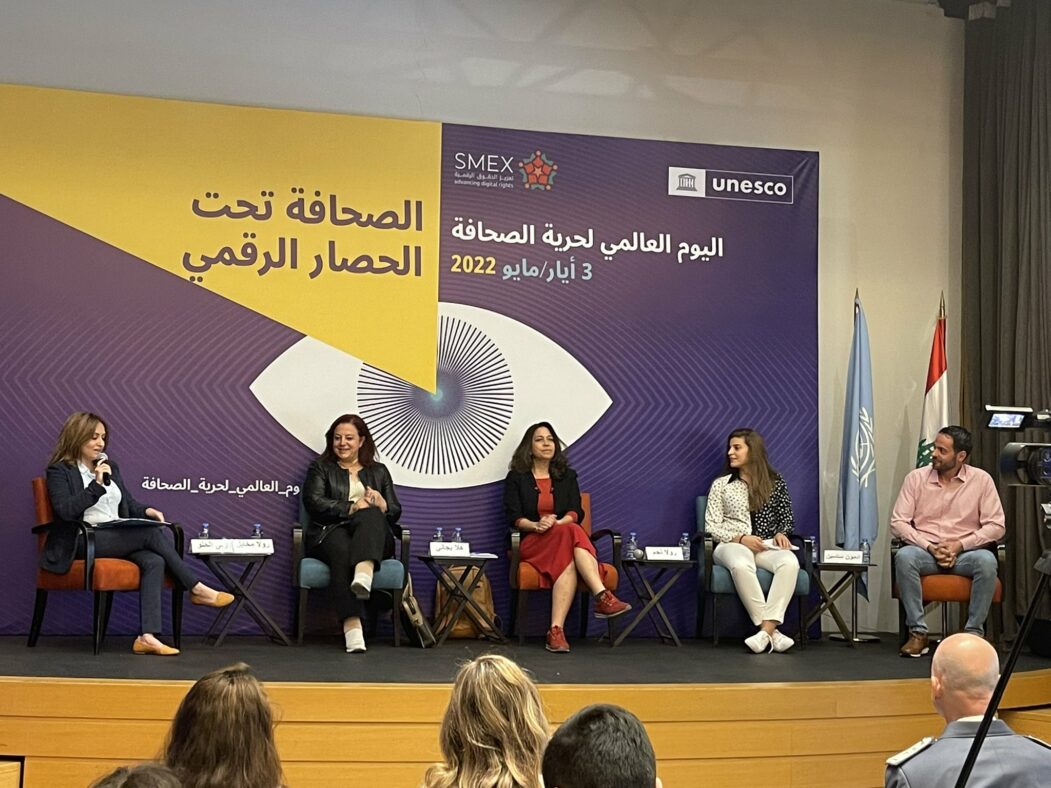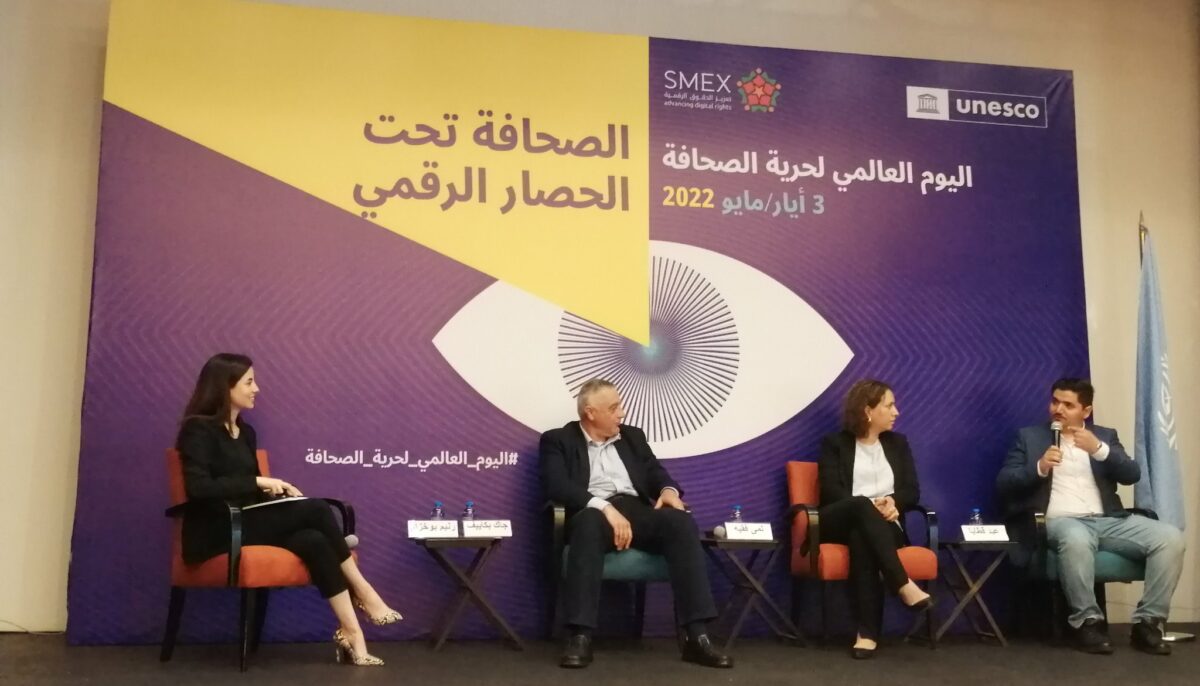On the occasion of World Press Freedom Day, celebrated on May 3, the UNESCO office in Beirut, in partnership with SMEX, held, on April 28, a conference titled “Journalism Under Digital Siege’’ to discuss the challenges faced by journalists in today’s digital age. The event focused on the impact of the latest developments in monitoring and surveillance technology on journalism and the freedom of expression.
Over the past five years, 85% of the world’s population have seen a “decline in press freedom in their country, and 400 journalists have been killed while doing their job,” according to an UNESCO report.
UNESCO estimates indicate that newspaper advertising revenues around the world have dropped by half, severely undermining the survival of media outlets. These threats have been exacerbated by the “emergence of new technologies and the increase of digital attacks, particularly against female journalists.”
Unchecked development and deployment of surveillance technologies, digital platforms’ policies and practices that violate human rights, as well as large-scale data collection and retention, have all significantly altered the media landscape across the world, including the Arabic-speaking region. These threats pose risks in terms of reprisals against media workers and their sources, preventing media professionals and the press from freely exercising their work, restricting their access to information and compromising their personal safety.
Georges Awwad, Communication and Information Program Officer at UNESCO Regional Office in Beirut, said that “freedom of expression is a fundamental human right and is the foundation of all civil liberties. It is the cornerstone of democracy, and UNESCO has been entrusted with the task of protecting and promoting freedom of expression through both traditional and modern, internet-based means.”
He added that “the recently issued discussion paper for the UNESCO Global Trends Report under the title ‘Threats that silence: trends in the safety of journalists’ highlights the fact that surveillance and piracy undermine the press.” Awwad also stated that “the constant evolution of undetectable malware and spyware, as well as their increased use by governments and non-government actors against journalists and human rights advocates, are a threat to free and independent press.”
“Surveillance could reveal information gathered by journalists, including from informants, and could violate the principle of source protection, which is a universal prerequisite for the freedom of the press enshrined in United Nations resolutions. Surveillance could also jeopardize the safety of journalists by exposing sensitive private information that might be used to instigate malicious prosecution or attacks.”
Awwad added that “monitoring the movement of journalists using artificial intelligence and phishing attacks directed against them through data extraction and automated attacks also threaten the freedom of press. The low cost of such technologies enables government and private actors to engage in large-scale, disproportionate, more intrusive, and long-term surveillance operations at an unprecedented scale. Journalists and their sources are often unaware of such operations and unable to shield themselves.”
“There is growing support all over the world for more transparency about how internet companies use citizens’ data and exploit it to enhance predictive models and artificial intelligence and to intensify misinformation and hate speech,” concluded Awwad.
Digital Content Manager at SMEX Abed Kataya stressed that “just as audio, visual, and print media has evolved, so too have the means used to suppress it.”
“We face multiple challenges in our region, including obsolete and vague laws. These include cybercrime laws that consider articles and Facebook posts to be the only crimes on the internet. Other examples include defense and counter-terrorism laws and laws criminalizing fake news, which, of course, are designed to protect influential actors, rather than society.”
“Internet shutdowns are also becoming a widespread tool used in several countries in the region to varying degrees, with no consideration of the economic and humanitarian damages caused by such shutdowns. Finally, we cannot forget the blocking of thousands of news, media, and other websites.”
Kataya added: “More importantly, as digital tools have become an essential part of the journalist’s arsenal, their protection has become equivalent to protecting journalists themselves. Rather than surrender to these attacks, journalists are now fighting a new battle to take legal action against those who have spied on them using digital technologies, both in courtrooms and before public opinion.”
“Many of our colleagues have stood in solidarity and in support of one another, making concerted efforts to defy these threats and share best practices to ensure physical and digital safety, in order to protect their freedom of expression.”
The speakers discussed this year’s theme during two sessions. The first tackled “media freedom, spyware, safety of journalists, and the right to privacy in the digital era” and was moderated by journalist Raneem Bou Khzam from the UNESCO Beirut Office. Jack Bakaev from the Internet Society (ISOC), Lama Fakih from Human Rights Watch, and Abed Kataya from SMEX also addressed the freedom of the press amid the multifaceted digital attacks against journalists and the current technological advancements accompanying the evolution of digital surveillance and hacking tools.

The second session, entitled “media challenges in a culture of impunity,” was moderated by Rouba El-Helou, consultant and lecturer at Notre Dame University (NDU). Hala Bejjani from International Media Support (IMS), Roula Mikhael from Maharat Foundation, Roula Najem from SEEDS for Legal Initiatives, and Edmond Sassine from the Lebanese Broadcasting Corporation International (LBCI) made interventions during the session.
The session focused on the need to “protect courses and find solutions and alternatives to the current media system, as well as ways to improve media outlets from within without resorting to the judiciary – that is, promoting the self-management and internal regulations of media outlets to promote professional journalistic standards and ethics.”
The World Press Freedom Day is celebrated every year on the 3rd of May. It serves as a reminder for governments to “honor their commitments to ensure freedom of the press and for journalists to reflect on the issues of press freedom and professional ethics. Equally important, the World Press Freedom Day is an occasion to show support to media outlets in the face of the restriction or abolition of the freedom of the press, as well as to commemorate the journalists who have lost their lives in the pursuit of truth.”
The World Press Freedom Day was proclaimed by the UN General Assembly in 1993 based on the recommendation of the 26th session of the UNESCO General Conference in 1991.
This recommendation came in response to a call by African journalists, who issued the historic 1991 Windhoek Declaration for the Development of a Free, Independent, and Pluralistic Press.
National News Agency, UNESCO, SMEX



